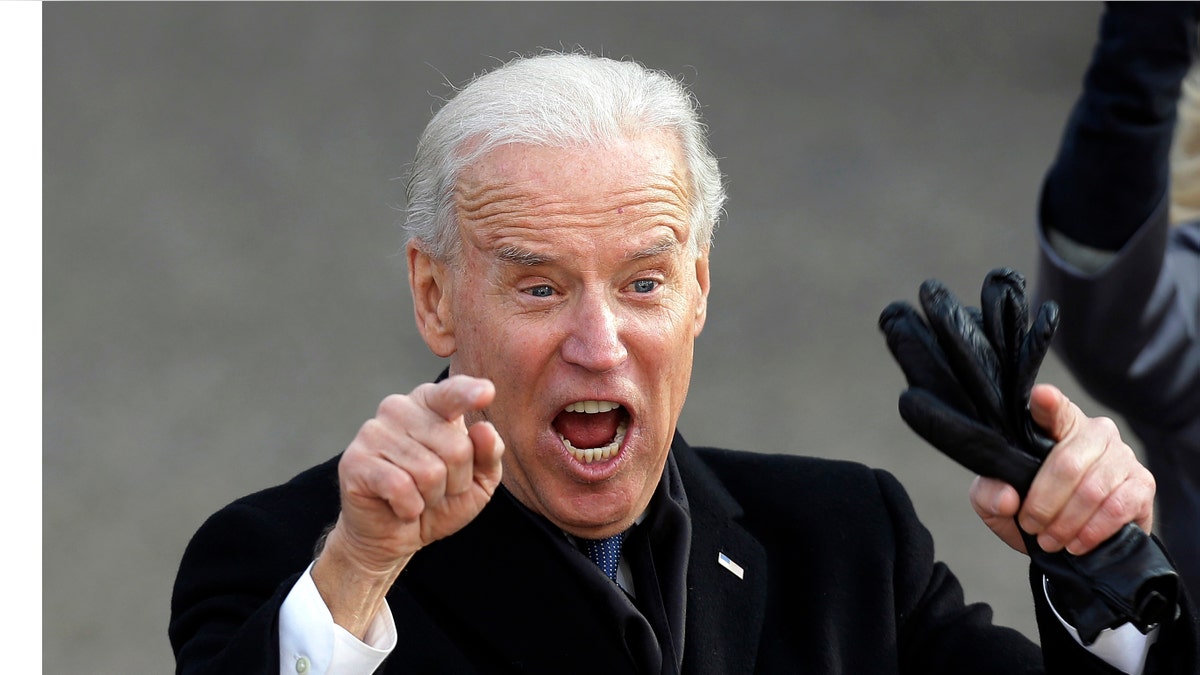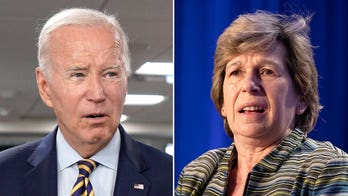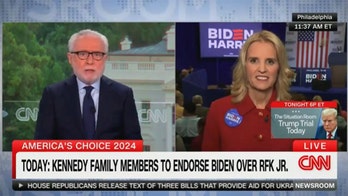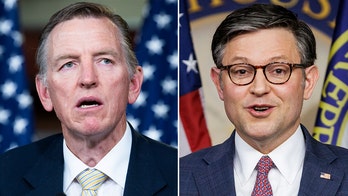
FILE: Jan. 21, 2013: Vice President Joe Biden walking down Pennsylvania Avenue to the White House, in Washington, during the Inaugural Parade. (AP)
Two of Washington’s biggest events last week -- the presidential inauguration and Secretary of State Hillary Clinton’s testimony on Benghazi -- also turned out to be early-but-critical moments for two top potential 2016 Democratic presidential candidates.
Vice President Biden moved across Washington -- even breaking into a jog along the Pennsylvania Avenue parade route -- like a man clearly excited about 2016 possibilities.
His private swearing-in ceremony was attended by New Hampshire Gov. Maggie Hassan, who would be a key ally in the state's first-in-the-nation primary. And he attended the State Society Inaugural Ball for Iowa, whose caucus results can kick-start a presidential run.
Meanwhile, Clinton’s long-awaited Capitol Hill testimony on the Sept. 11, 2012, deaths of four Americans at a U.S. outpost in Benghazi, Libya, essentially put the issue to rest for supporters but agitated critics who would be certain to revive the debate should Clinton run in four years.
“We don't know why the president and the secretary of state ignored the warnings,” Arizona Republican Sen. John McCain told ABC’s “This Week.” “There are so many questions that are unanswered.”
Biden’s demeanor last week and over the past few months prompted a Democrat close to the White House to tell Politico that the vice president is “ intoxicated by the idea.”
Political observers have said the Democratic field would be instantly cleared should Clinton, who has insisted she is exhausted and finished with public office, decide to run. The former first lady and New York senator would return as a more experienced politician than the one who lost to Obama in 2008. And her approval rating late last year was as high as 75 percent, according to one poll.
However, the recent emergence of Biden, whose middle-class appeal helped Obama get re-elected, has sparked debate about who the president would support and who might or might not step aside.
White House Press Secretary Jay Carney tried Wednesday to tamp down speculation, two days after the public inauguration, by saying: “For the sake and sanity of all involved, it's worth taking a bit of a break from presidential election year politics."
Biden will be nearly 74 on Election Day 2016. But he is well aware of how campaigns work and the energy that is needed, after unsuccessful bids in 1988 and 2008.
In addition, the former Delaware senator has compiled a list domestic and foreign policy achievements in Washington, even as his occasional off-script moments have become fodder for Republican critics. In fact, Biden helped reach a deal several weeks ago with Senate Minority Leader Mitch McConnell to avert the fiscal crisis.
"There's a whole lot of reasons why I wouldn't run," Biden told CNN before the inauguration. "I don't have to make that decision for a while. In the meantime, there's one thing I know I have to do, no matter what I do. I have to help this president move this country to the next stage."
Biden also has good, fresh contacts with members of the Democratic ground game in such key states as Florida, Iowa, Ohio and New Hampshire. And he has a decent approval rating -- 49 percent according to the most recent New York Times/CBS poll.
"It seems obvious that he's going to keep that option open for himself and do the right things," said Mike Gronstal, the Democratic leader of the Iowa state Senate.
Prior to the recent Biden talk, young Democratic Govs. Andrew Cuomo, New York, and Martin O’Malley, Maryland, each appeared to have a clear path toward a potential nomination.
Though they now might have to wait, both are pushing ahead with a legislative agenda like the one voters supported in re-electing Obama.
What issues might emerge during the next presidential election cycle remains unclear.
But Cuomo has already gotten the state legislature to pass his proposal for tougher gun laws, in the wake of the shootings last month inside a Connecticut elementary school in which 20 first-graders and six adults were killed.
He has also proposed a “Reproductive Health Act" as part of a 10-point plan to advance "women's equality" that is expected to include language that would allow abortion after 24 weeks of pregnancy if it is "necessary to protect a woman's health."
O’Malley, who was a frequent advocate for Obama through the 2012 election cycle, must leave the Maryland state house because of term limits. But last year he started a federal Political Action Committee that allows him to raise money for future office.
He also already this year has renewed efforts to bring offshore wind energy to Maryland, called for more early voting on Election Day and wants to restricts mental-health patients' access to firearms as part of his gun-control plan.
The Associated Press contributed to this report.




